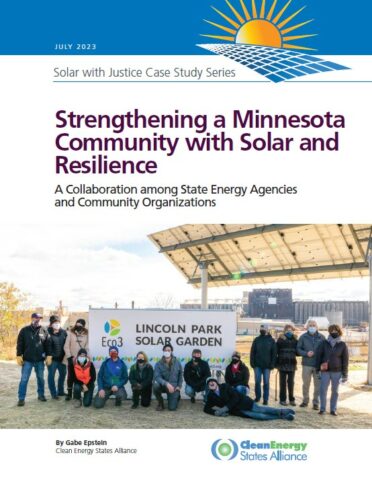Strengthening a Minnesota Community with Solar and Resilience
Gabe Epstein | Clean Energy States Alliance
Duluth’s Lincoln Park neighborhood is a community of approximately 6,000 residents, most of whom have a household income of less than $35,000 annually. To support economic stability and energy resilience in this neighborhood, Duluth-based nonprofit Ecolibrium3 constructed a 38-killowatt community solar array in 2020. The income generated from the array is used to defray electricity costs for local veterans’ housing, and it will also be used to support weatherization and energy efficiency upgrades for low-income families. Ecolibrium3 is currently developing a community Resilience Hub to support residents both year-round and in the event of severe weather.
In building the community solar array and Resilience Hub, Ecolibrium3 collaborated closely with community partners as well as statewide organizations and state agencies, such as the Minnesota Department of Commerce. These partnerships provided technical assistance, community outreach, visioning, and project funding.
This case study details the development of both the solar array and Resilience Hub. It describes how both projects were designed, community engagement strategies used, the role of key stakeholders such as Minnesota’s Department of Commerce, and barriers faced in Ecolibrium3’s work.
This project provides a useful model for community-based organizations and state energy agencies interested in developing their own equity-focused energy and resilience projects.
This case study was developed as part of the Clean Energy States Alliance’s (CESA) Solar with Justice: Connecting States and Communities project. The Solar with Justice project aims to bring together state energy agencies (SEAs) and community-based organizations (CBOs) developing solar for environmental justice communities to create opportunities for dialogue and collaboration. This case study is the second of six case studies that will be published by CESA under the Solar with Justice project, highlighting models of collaboration between CBOs and SEAs on solar for environmental justice communities.
This case study is based upon work supported by the U.S. Department of Energy’s Office of Energy Efficiency and Renewable Energy under the Solar Energy Technologies Office Award Number DE-EE0009360. Under this project, known as Solar with Justice, CESA is working in conjunction with academic and nonprofit partners to understand and improve how state energy agencies and community-based organizations collaborate on solar.
Associated Project(s):
Resource Details:
Date: July 6, 2023
Type: Report
Topic(s): Community Solar, Energy Storage, Low- and Moderate-Income Clean Energy, Resilient Power, Solar PV

